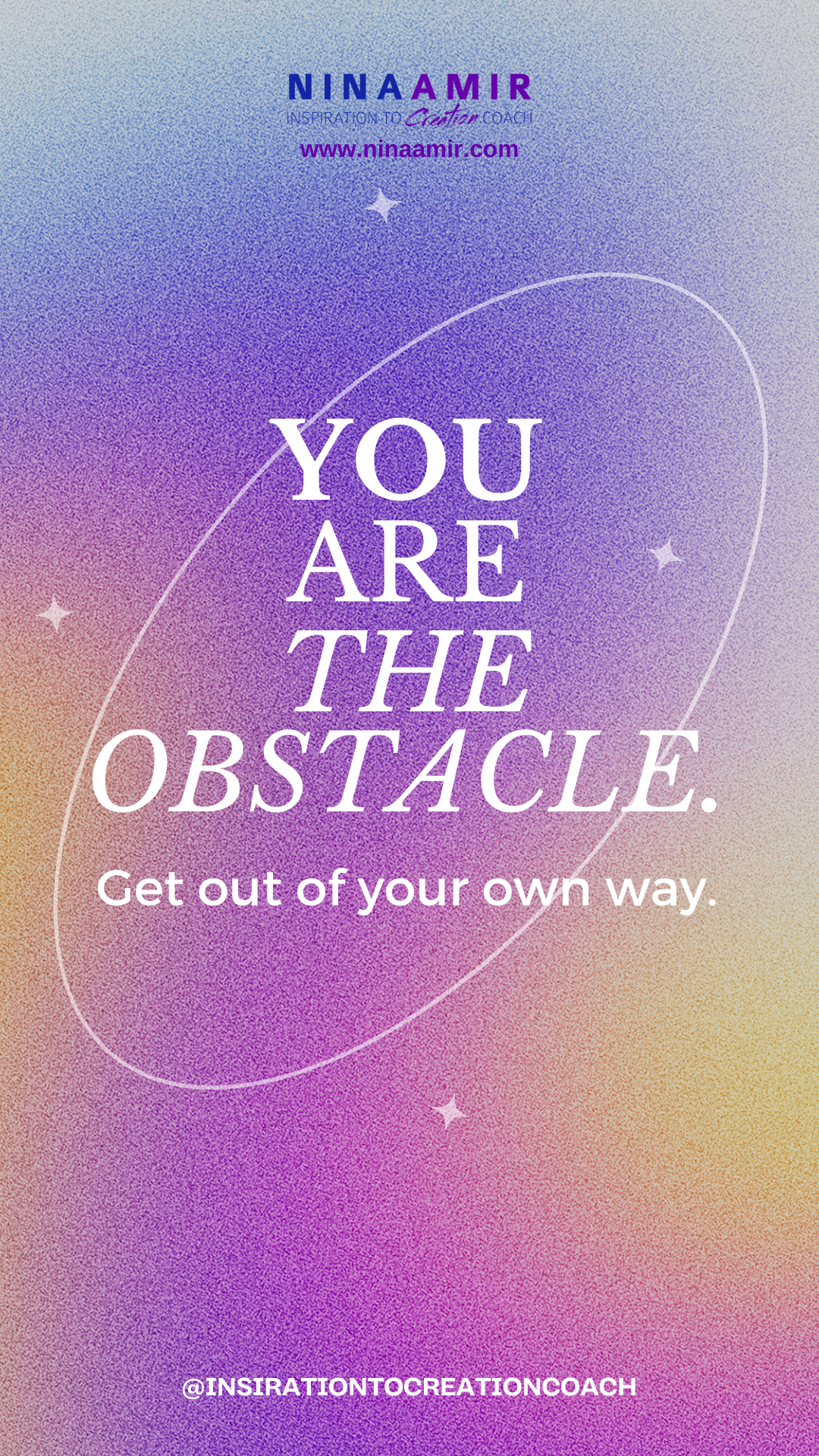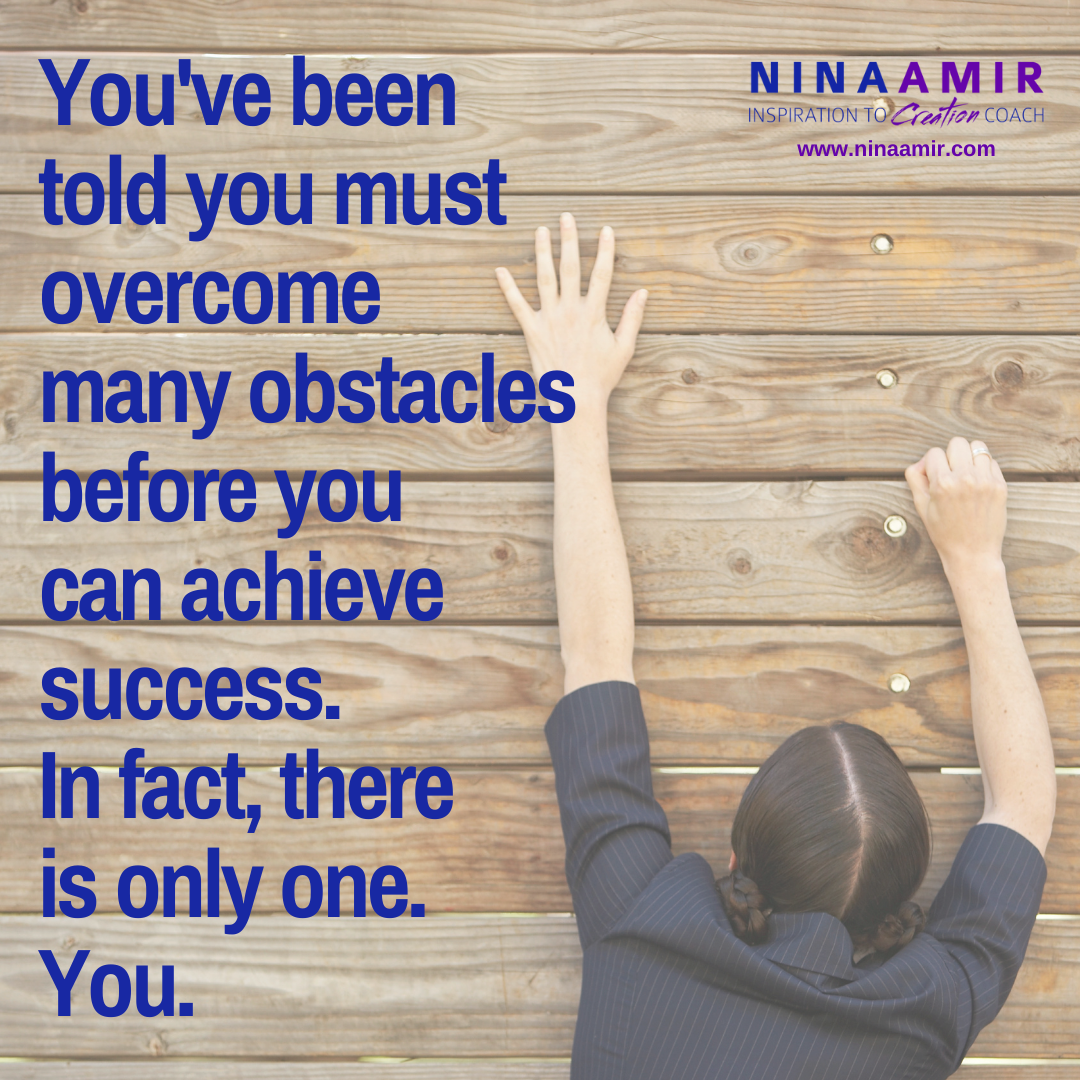Our society perpetuates the belief that you must overcome numerous hurdles to succeed. These might include high levels of skill or knowledge, large amounts of time, vast quantities of money, and connections with the right people. While some of this may be true, only one real obstacle blocks the way to your success in any life arena. If you remove it, the other hurdles are easy to overcome.
Can you identify the obstacle?
You.
You are the only obstacle you need to overcome to succeed at anything you want to achieve. Specifically, your habitual behaviors and mindsets create internal hurdles you must constantly try to jump or remove. These include how you react to situations and your thoughts about circumstances and people.
Ultimately, you must get out of your own way if you want to succeed. To do that, change your habitual behavior and mindset.
Personal Growth Makes Success Easier
Suppose you ask someone super successful how they accomplished that feat. They likely will say they worked hard, acquired skills and knowledge, and were diligent, committed, and tenacious in pursuing their goals. Most also will tell you they “worked on themselves.” In other words, they engaged in some sort of personal growth or development.
High performers know their own behavioral and mental tendencies slow their ability to achieve success. Only if they take time for personal change can they alter those tendencies and succeed professionally or personally.
And so they invest in themselves by joining masterminds, programs, and courses. They hire therapists and coaches. And they read books about self-improvement and apply what they learn.
These efforts help them change their identity, behavior, and mindsets. As a result, achieving success in any life arena becomes much easier.
What Happens When You Get Out of the Way
Here’s an example demonstrating how getting out of your own way (changing yourself) enhances your ability to succeed.
I had a client who believed she couldn’t complete projects. She would describe herself as “someone who never finishes what she starts.” That was her identity.
As a result, she found it tough to succeed at anything. That makes sense since you do need to complete projects or goals to succeed.
 This woman rarely started anything new for fear she would disappoint herself again. Her mind was focused on thoughts like, “Why start? I won’t finish,” or “If I start and don’t finish, I’ll just feel horrible about myself, so I won’t bother.” Thus, she looked at her life through that lens (mindset) and only saw incomplete projects.
This woman rarely started anything new for fear she would disappoint herself again. Her mind was focused on thoughts like, “Why start? I won’t finish,” or “If I start and don’t finish, I’ll just feel horrible about myself, so I won’t bother.” Thus, she looked at her life through that lens (mindset) and only saw incomplete projects.
Her behavior followed suit. She didn’t start new projects—no matter how important they were to her. And if she did start, she inevitably didn’t finish.
Then she did personal growth work, like coaching with me. She identified a few past projects she had finished, which helped her realize she could complete things. At that point, she could use that knowledge to help her complete current and future projects.
Also, she decided to stop disappointing herself. Instead, she chose to be self-integral and keeps her promises to herself. With two new ways of seeing herself—as someone who knows how to complete projects and has self-integrity, not only did her mindset shift, but her behaviors, too.
She began thinking, “I finish what I start” and “If I say I will finish something, I do because I have self-integrity.” Eventually, these became her beliefs, thus changing her mindset. And she proved that this was true each time she completed a project or goal.
And she began working on projects to finish on a deadline. Her priority was to finish something before starting a new project or goal. As a result, she began consistently finishing the things she started.
As you can imagine, the changes she made in her mindset and behavior made all the difference in her ability to succeed.
Your Habitual Behaviors
Unhelpful habitual behaviors can take many forms. For example, you might react with anger whenever someone cuts you off in traffic, hit the snooze button daily when the morning alarm rings, or spend too much time scrolling on social media. Or, like my client, you might habitually start projects you don’t finish. These habits don’t help you succeed.
Not only that, they are reactions rather than responses. Reactions are habitual or unconscious ways of behaving in certain situations. Often something triggers you—like the jerk who cut you off or the sound of the morning alarm—and you react in the same way as always.
On the other hand, responses are intentional and conscious. For example, you decide how to behave when someone cuts you off, like taking a deep breath and feeling grateful that you didn’t get in an accident. Or you choose to get out of bed when the alarm rings to have time for a morning routine that sets you up for success.
Reactions tend to reap negative results. They don’t help you progress toward success—and sometimes even cause you to move back a few steps. Responses have a higher probability of positive results because you choose them intentionally to help achieve a goal. Therefore, they successfully help you get from Point A to Point B.
Your Habitual Mindsets
Unhelpful habitual mindsets are created by unsupportive thoughts you think repeatedly. If you think a thought often enough, it becomes a belief. And all your beliefs influence your mindset.
Many of your repetitive thoughts stem from early programming or life experiences. For instance, someone influential—like a parent, teacher, or coach—told you something, and you chose to believe it. They “programmed” you to think you were intelligent, stupid, talented, or untalented, for instance.
Or you had an experience, like being cheated on by your intimate partner, and interpreted that event to mean something specific. Maybe you decided people couldn’t be trusted or relationships aren’t worth the pain.
Such thoughts become your beliefs and then your mindset. And your mindset becomes the lens through which you see the world, including your experiences and the people you meet.
Let’s say you have a million dollars in the bank. Yet, most of your life, you believed you lacked money. When you look at your bank account, you see the total but still think, “I don’t have enough money.” Your mindset clouds your vision and doesn’t allow you to acknowledge that you are a millionaire. You’ll never feel financially successful—even if you are.
However, if you believe you always have enough money—and are grateful for the money you have saved—you see yourself and your circumstances differently. Your mindset provides a lens that helps you see abundance and prosperity. And that mindset will help you act in ways that make you financially successful.
Or let’s say life experiences have caused you to believe you aren’t good enough. You see everything through this lens. You won’t think you are good enough to get a promotion or date with that fabulous person you met. In fact, you’ll never feel good enough for anything.
A not-good-enough mindset is an obstacle to success. It keeps you stuck wondering if you are good enough to tackle any challenge successfully—including landing the job and the date. And you’ll likely see many signs that your belief is true—you really aren’t good enough.
Change your mindset, though, and your ability to achieve success changes. When you are good enough, you have the confidence to apply for a job and ask the person on a date. In fact, you’ll know you are good enough to deserve a promotion or pursue your craziest dream. You’ll see yourself differently, and your results will be different.
How to Remove the One Obstacle to Success
Removing the obstacle—you—takes changing your habitual behaviors and mindsets. Both are accomplished by becoming intentional and aware of your actions and thoughts. Habits tend to be unconscious. Thus, you have to bring them into your consciousness.
Do this by identifying two life arenas first:
- an area in which you feel successful.
- an area in which you feel challenged.
Next, write down the thoughts and behaviors you have related to each.
For example, maybe you feel challenged in the life arena of your career. You might think you are unappreciated or unrecognized for your contribution. As a result, you no longer try hard or offer to take on special projects. You just do what is necessary to get by.
Perhaps you feel pretty successful as a parent. You might think, “I’m a good parent,” or “Parenting comes naturally to me.” As a result, you do whatever it takes to care for your children without hesitation. You make decisions about their well-being and find solutions to parenting problems without doubt regarding your ability to “get it right.”
Notice that, in the areas where you succeed, you have positive thoughts and well-planned or confident responses. In the areas you feel challenged, you likely have negative thoughts, unplanned reactions, or lack of confidence.
Once you have gone through this exercise, your next step involves applying your “success strategies” to the areas where you find it harder to succeed. These are the behaviors and mindsets that help you succeed. For instance, your confidence as a parent could be applied to your career challenges. Be more confident at work.
Or you can write new positive thoughts or affirmations to repeat consciously to yourself. Also, decide how to act or respond, choosing ways you feel will result in success.
Three Essentials Necessary for Getting Out of Your Way
Getting out of your own way isn’t really that hard. It just takes three essentials things:
1. The willingness to take responsibility for your current behaviors and mindsets. Once you have done that, you can also be responsible for changing the ones that don’t serve you.
2. Awareness of your behaviors and mindsets. When you know what you are thinking and doing that makes you an obstacle, you can change them. This moves you out of the way.
3. The determination to succeed. As with any endeavor, determination is essential. To successfully remove the obstacle blocking your success, you must be committed to making personal changes that help you succeed.
There is no reason to overcome many hurdles on your way to success. Instead, overcome the one obstacle blocking your path. When you do that, all the other hurdles disappear or become easy to overcome.
How are you blocking your ability to succeed? Tell me in a comment below. And please share this post with a friend or on social media.
If you want to create transformation quickly so you can succeed, let’s chat. Get on my calendar here. Or join the Inspired Creator Community for group transformational coaching every month.
 It’s time to transform, is it not? Join the Inspired Creator Community. You probably already realize that you need to change from the inside out. That’s how you become a person who does the things that allow you to create your desires. As a member, you get access to intuitive transformational coaching, world-class personal growth coaching, and strategies for living a life that feeds your soul. And you will discover that you are a powerful creator able to create what you want (not what you don’t want). Join now!
It’s time to transform, is it not? Join the Inspired Creator Community. You probably already realize that you need to change from the inside out. That’s how you become a person who does the things that allow you to create your desires. As a member, you get access to intuitive transformational coaching, world-class personal growth coaching, and strategies for living a life that feeds your soul. And you will discover that you are a powerful creator able to create what you want (not what you don’t want). Join now!


